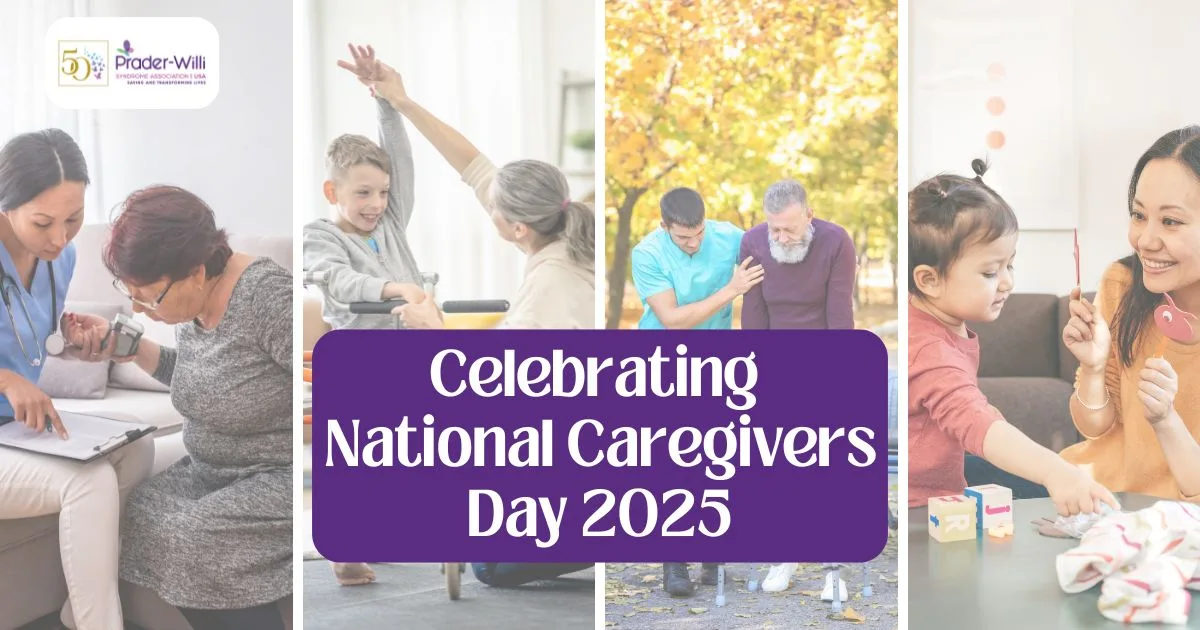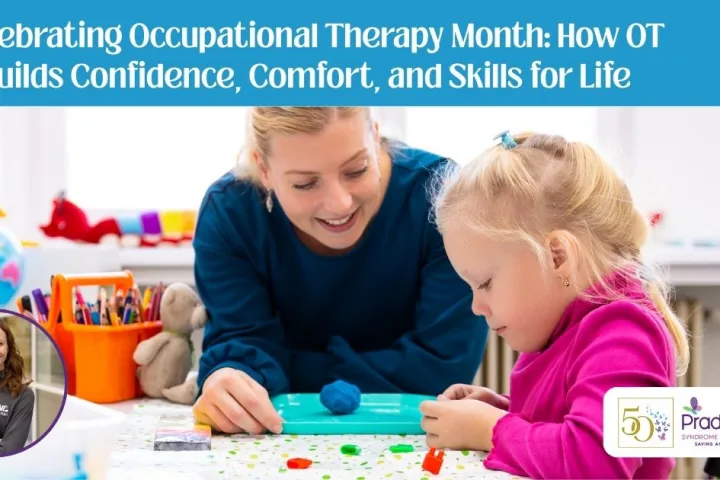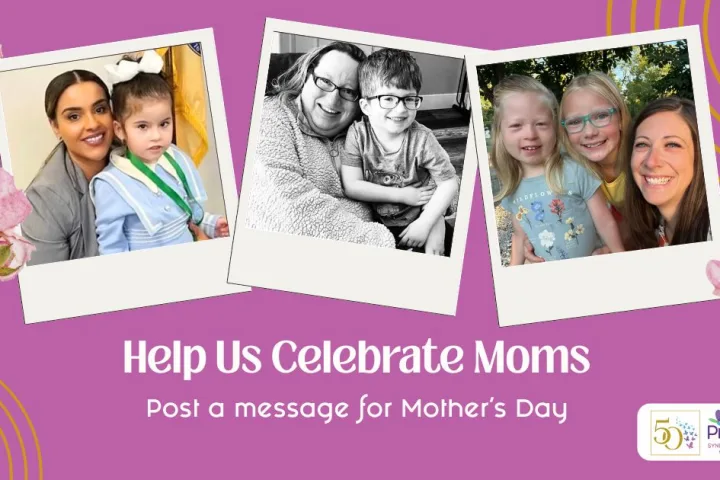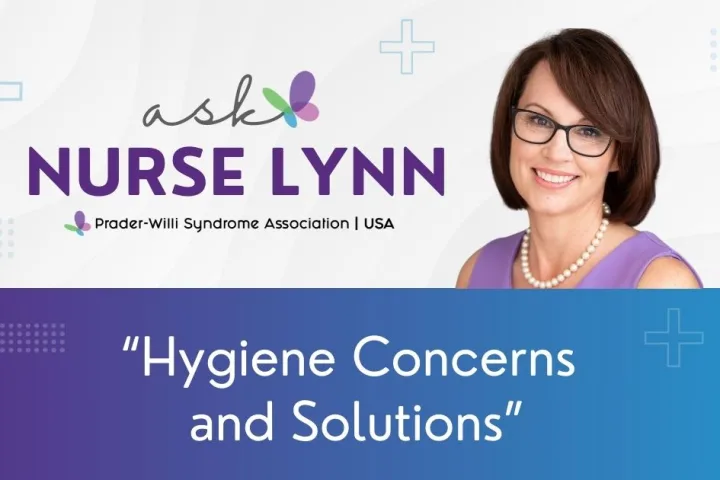Caregivers are a critical piece to helping our loved ones with PWS live successful lives. Whether those caregivers come into our home or meet our loved ones in the community, their attention to their safety, dedication to their needs and development, and pursuit of our loved one’s happiness is a balm to the challenges of this disorder. For every caregiver who comes into our lives, whether for a brief period or for decades, we are truly grateful for all of them!
This Feb 21, 2025, is National Caregivers Day and we’d like to take a moment to honor the caregivers in our loved one’s lives. Below is a list of the different types of caregivers your loved one may encounter, and we encourage you to show them your gratitude. Write them a thank you card, give them a gift certificate for a local restaurant, or send them flowers. Remind them how needed they are and how grateful you are for them. If you’d like more ideas on thanking care staff, as well as ideas for self-care for caregivers, please check out our past blog Gratitude for Caregivers on National Caregivers Day – Prader-Willi Syndrome Association | USA
Remember that “caregiver” describes a wide variety of people and that you are likely on that list. Parents and family members who show up out of love are often the best, and most overwhelmed caregivers. Caregiver burnout is a very real part of the experience, especially in a time when we may feel unsure about so many aspects of the future, and we encourage all caregivers to take time for self-care, self-love, and space. For ideas on how to care for yourself as a caregiver, please read our blog Self-Care for Caregivers – Prader-Willi Syndrome Association | USA
If you are feeling overwhelmed as a caregiver, with grief or worry or just the details of caring for someone with PWS, please know that you can reach out to PWSA | USA for help at info@pwsausa.org.
Types of Caregivers
Respite Care: Caregiver who steps in when the primary caregiver of an individual needs to take a break for work, errands, self-care, etc. This may be a family or friend, someone who works in a facility, or someone who comes from an agency. The care often takes place in the home, with or without the main care provider present.
Residential Care Providers: Care providers at residential living facilities where individuals live and receive 24-hour care and support.
Independent Caregiver: Home care professional who does not work for an agency, is employed directly by the family, and provides personal care.
Agency Home Caregiver: Provides care and support in the home. They are often contracted to agencies and will be assigned several patients to give care to throughout the week. The agency typically provides some level of background check/screening and may provide training.
Adult Day Center Care Provider: Works at facilities designed for adults with permanent disabilities who need a combination of medical care, supervision, education, and social support throughout the day.
Special Education Aides: Help children with disabilities in schools. They can be either 1:1 or classroom based and are in addition to the teacher to help the student with educational needs, mobility, or safety.
Behavioral Therapists: Support individuals with behavioral challenges (e.g., ABA therapists for autism).
Social and Community-Based Caregivers: Case managers, disability advocates, and social workers who help with resources, rights, and benefits. Provide emotional and social support, often through community programs.
Skilled Nursing Home Caregiver: Specializes in cases where the patient needs specialized support. This could include home-based physiotherapy support, helping to get a client’s home physically set up to support the client, and home-based medical care.
Family Caregivers: Relatives, friends, or neighbors who assist in the activities of daily living. Their work is often unpaid, and they have no formal training to provide those services. Family carers can sometimes receive rebates, tax incentives, and other social supports to help relieve some of the difficulties faced when becoming a caregiver for a family member.
Volunteer Caregiver: May be a student or someone in training looking for more experience in caregiving. Unpaid.
Informal Carer: A person who performs a caring role without being formally recognized as such. They may perform caring tasks without even realizing that they may be classified as a carer.
Share this!





 Jennifer Bolander has been serving as a Special Education Specialist for PWSA (USA) since October of 2015. She is a graduate of John Carroll University and lives in Ohio with her husband Brad and daughters Kate (17), and Sophia (13) who was born with PWS.
Jennifer Bolander has been serving as a Special Education Specialist for PWSA (USA) since October of 2015. She is a graduate of John Carroll University and lives in Ohio with her husband Brad and daughters Kate (17), and Sophia (13) who was born with PWS. Perry A. Zirkel has written more than 1,500 publications on various aspects of school law, with an emphasis on legal issues in special education. He writes a regular column for NAESP’s Principal magazine and NASP’s Communiqué newsletter, and he did so previously for Phi Delta Kappan and Teaching Exceptional Children.
Perry A. Zirkel has written more than 1,500 publications on various aspects of school law, with an emphasis on legal issues in special education. He writes a regular column for NAESP’s Principal magazine and NASP’s Communiqué newsletter, and he did so previously for Phi Delta Kappan and Teaching Exceptional Children. Evan has worked with the Prader-Willi Syndrome Association (USA) since 2007 primarily as a Crisis Intervention and Family Support Counselor. Evans works with parents and schools to foster strong collaborative relationships and appropriate educational environments for students with PWS.
Evan has worked with the Prader-Willi Syndrome Association (USA) since 2007 primarily as a Crisis Intervention and Family Support Counselor. Evans works with parents and schools to foster strong collaborative relationships and appropriate educational environments for students with PWS. Dr. Amy McTighe is the PWS Program Manager and Inpatient Teacher at the Center for Prader-Willi Syndrome at the Children’s Institute of Pittsburgh. She graduated from Duquesne University receiving her Bachelor’s and Master’s degree in Education with a focus on elementary education, special education, and language arts.
Dr. Amy McTighe is the PWS Program Manager and Inpatient Teacher at the Center for Prader-Willi Syndrome at the Children’s Institute of Pittsburgh. She graduated from Duquesne University receiving her Bachelor’s and Master’s degree in Education with a focus on elementary education, special education, and language arts. Staci Zimmerman works for Prader-Willi Syndrome Association of Colorado as an Individualized Education Program (IEP) consultant. Staci collaborates with the PWS multi-disciplinary clinic at the Children’s Hospital in Denver supporting families and school districts around the United States with their child’s Individual Educational Plan.
Staci Zimmerman works for Prader-Willi Syndrome Association of Colorado as an Individualized Education Program (IEP) consultant. Staci collaborates with the PWS multi-disciplinary clinic at the Children’s Hospital in Denver supporting families and school districts around the United States with their child’s Individual Educational Plan. Founded in 2001, SDLC is a non-profit legal services organization dedicated to protecting and advancing the legal rights of people with disabilities throughout the South. It partners with the Southern Poverty Law Center, Protection and Advocacy (P&A) programs, Legal Services Corporations (LSC) and disability organizations on major, systemic disability rights issues involving the Individuals with Disabilities Education Act (IDEA), Americans with Disabilities Act (ADA), and the federal Medicaid Act. Recently in November 2014, Jim retired.
Founded in 2001, SDLC is a non-profit legal services organization dedicated to protecting and advancing the legal rights of people with disabilities throughout the South. It partners with the Southern Poverty Law Center, Protection and Advocacy (P&A) programs, Legal Services Corporations (LSC) and disability organizations on major, systemic disability rights issues involving the Individuals with Disabilities Education Act (IDEA), Americans with Disabilities Act (ADA), and the federal Medicaid Act. Recently in November 2014, Jim retired.